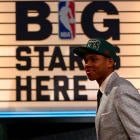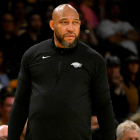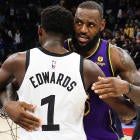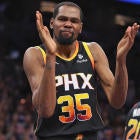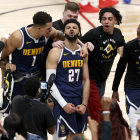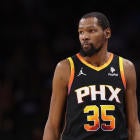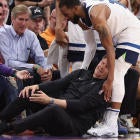
On June 27, 2013, commissioner David Stern walked to the podium at Barclays Center, cleared his throat and announced, "With the 15th pick in the 2013 NBA Draft, the Milwaukee Bucks select Giannis Antetokounmpo from Athens, Greece."
A skinny 18-year-old, unknown to most fans and even some high-level NBA personnel -- "I didn't know who the hell he was," Gregg Popovich said -- stood up in the crowd. He hugged his brother, Thanasis, who was draped in a Greek flag, buttoned his suit jacket, walked to the stage, shook the commissioner's hand and began his NBA journey. Ten years in, that journey is one of the most impressive and improbable in the history of professional sports.
This oral history, with insight from more than 30 current and former teammates, opponents, coaches and opposing coaches, tracks Antetokounmpo's rise from NBA Draft mystery man to two-time MVP and NBA champion.
'Three yards and a cloud of dust basically every possession'
The first time Antetokounmpo stepped on the court for an NBA game was Oct. 30, 2013, at Madison Square Garden, the site of several key moments throughout his evolution. That he played just four minutes and 43 seconds and scored one point mattered little to him. He grew up selling toys, watches and video games on the streets of Athens, and he spent the previous season in the Greek second division. He had made it.
Antetokounmpo's first season was a bit of a bumpy ride. His playing time, role and production all fluctuated. It was clear, though, that he had immense potential and the desire to reach it. And it was clear that the Bucks had something.
Josh Oppenheimer, Bucks assistant coach, 2013-16; 2020-present: I was there as soon as he got here, I worked him out the first time he ever worked out. Obviously, he was different. He was 6-8 and a half, 185 pounds, and I think the goal was, from my point of view, could he be Scottie Pippen-like?
Khris Middleton, Bucks forward, 2013-present: Heard about him being drafted; skinny kid that had a lot of potential. He was 6-9 at the time, long, wiry, but you could see he had a certain skill set with dribbling the ball, having the ball in his hands. He wasn't your traditional big man, he was actually a wing player who played like a guard in a 6-9, 6-10 body.
Josh Oppenheimer: He could handle the ball, he had great vision, his IQ was really high. I thought, could he be a multidimensional, multi-positional type of playmaker? And I think, if he would have stayed 6-8 or 6-9, he would have been. He would have been a great player regardless.
"In 15-20 years, maybe my number is up there next to Kareem, Oscar Robertson... I hope I'm there." @Giannis_An34 in 2013 pic.twitter.com/XtY9mDrxJm
— NBA (@NBA) July 19, 2021
Giannis Antetokounmpo: First of all, Year 1, that boy was a bad boy. Year 1 -- I saw this clip, who showed me this clip? [Bucks director of content] Nick Monroe, I think. He showed me a clip of me checking into a game in New York. I was 18 at the time and my eyes, you can see my eyes, you can see a hunger.
Erik Spoelstra, Heat coach: Usually young players come in and they're trying to get a feel, gain some confidence. You're not really sure what your role is, what the expectations should be for you. He was three yards and a cloud of dust basically every possession. Not much has changed, I guess, because he's a force of nature. But when you see someone that young -- and he wasn't as physically strong as is now, but he had that mentality -- that made you pay attention.
Josh Oppenheimer: His competitive spirit, his nature, who he was as a person, how he approached everything was no different than it is now. He just wasn't experienced and who he is now from a physical standpoint.
Giannis Antetokounmpo: I came from Greece, I came from a neighborhood, Sepolia. You put me in Madison Square Garden and I was like, "I don't care, I'm just gonna try to hoop." Now that I'm older, if I go back in that situation I'm like, "OK, I'm 18, I'm scared, I'm a rookie." Now that I've been around the league for 10 years, I'd probably be more scared now. That Year 1 kid was fearless. He had goals, he was a hardworking kid and I'm extremely proud of that kid.
'Am I the point guard?'
After the Bucks finished 15-67 in Antetokounmpo's rookie season, new coach Jason Kidd, a Hall of Fame point guard himself, put the ball in Antetokounmpo's hands. Though he got some reps in summer league, the coaching staff only implemented the "Point Giannis" plan in the regular season because the team was shorthanded.
In three-plus seasons under Kidd (and 37 games under interim coach Joe Prunty), Antetokounmpo bulked up, evolved into a No. 1 option, was named Most Improved Player and made multiple appearances on All-Star, All-NBA and All-Defensive teams. He also jumped over a guy.
Jason Kidd, Bucks coach, 2014-2018: When you talk about Giannis' skill set, I think we were both learning from each other. Giving him the ball, him not being ready, I think that was a cool thing for a player to say, "Not right now." This was during a preseason game, and for us to shelve it and come back later to give him the ball after the All-Star break, that's when Giannis was born.
Joe Prunty, Bucks assistant coach, 2014-18, 2023-present; interim coach, 2018: Ultimately what happened was we had a situation where none of our point guards were healthy. We didn't want Giannis thinking he was the "point guard" so one of the things we said to him before the game that morning was, "Look, Giannis, if you rebound the ball, bring it up the floor." So then at one point, he asked one of the coaches, "Am I the point guard?" And we said, "No, just do what we're saying." Because we didn't want him to get caught up in being the point guard. It was born out of necessity.
Josh Oppenheimer: Initially, he was a point guard. He saw the game as a point guard.
Jason Kidd: You see his willingness to give to the community, to his country, that's who Giannis is. And that's who he is on the court. He's unselfish, his vision, his ability to pass and make some of those passes that most people can't make. That was the idea; it didn't work right off the bat, but he kept working, we kept working and eventually it connected and he took off.
Joe Prunty: His second year, we won 41 [games]. We go to the playoffs against Chicago and we're down 3-0, we win a game at the buzzer, then we go to Chicago, we win and we come back for Game 6. There's a phrase: "How are you gonna respond when you get punched in the mouth?" Mike Dunleavy literally punched us in the mouth. It wasn't a figure of speech. Giannis is pissed off. There's a play later in the game where Giannis sprints from the corner in front of our bench, all the way diagonally across the court and just clobbers Mike Dunleavy. You watch this play and you're like, "OK, we understand why you're doing this, but you can't do it this way."
Michael Carter-Williams, Bucks guard, 2015-16: I think the biggest thing I remember is, like, one out of every seven or eight plays he'd have this moment where you'd just look and be like, "Dang, that's gonna turn into 10, 11, 12, 13 times a game, and it's gonna look scary." People kept seeing those moments happen and could see the ceiling that he was gonna reach.
Pat Connaughton, Bucks wing, 2018-present: We played Milwaukee in the Bradley Center when I was in Portland [in 2017]. You can look up the game, it was a close game, we were winning the majority of it then we had the ball, tie game, five seconds left. He stole the ball from CJ McCollum at midcourt and took like one dribble and dunked it. It was more just the freakishness of the steal he had on CJ using his length, and then the three steps he took to actually dunk the basketball.
Joe Prunty: I was on the bench and they asked me about [Antetokounmpo's alley-oop over Tim Hardaway Jr.] after the game and I just said, "I think the New York crowd gave you an indication of how big of a play it was." Because, when he did it, it wasn't like this overarching yell. It was more like a gasp, like took your breath away, like, Did that just happen? And then, when you go back and watch it over and over again, it's like, No, that happened. You really were in disbelief that you saw what you saw. I could say I guess that was nasty, but, like I said, it was a gasp.
Udonis Haslem, Heat center: I remember how thin he was. He hit me with that Eurostep, and he missed the shot, but the length that he covered with the Eurostep was abnormal. I had never seen nobody cover that much length coming down on the break, so that was something that always stood out to me.
Joe Prunty: Even my first time seeing him in person and meeting him was, OK, he's extremely slender right now, but you can see where he can get bigger and stronger. He had good shoulders that he could put strength on that wouldn't weigh his body down.
Draymond Green, Warriors forward: Came in a very weak kid, probably one of the strongest guys, if not the strongest guy in the league now. I think it's just strength and the work that he's put in on his body has made a tremendous difference in his game. When you know you can physically outwill somebody, that's gonna give you confidence, so that goes hand in hand. I think just his physical gifts are something you can't really prepare for. There's no other Giannis in the league.
Josh Oppenheimer: He's always been a great worker, a diligent worker, a focused worker. Whether that's on the court, the weight room, watching film, he's always approached every day as a day to get better and to work. Step by step, and slowly it all came together. But it took time, his body took time, he grew into his body, he figured out his body, he figured out the things he could do.
'OK, slow the f--- down, man'
In Milwaukee, Antekounmpo's work ethic is nothing short of legendary (or "insane," as ex-Bucks guard Matthew Dellavedova described it). He entered the league blessed with a scary combination of length, speed, vision, ballhandling and IQ, but all of that stuff wouldn't have coalesced into superstardom if he were not such a maniac. At the age of 21, having already won Most Improved Player and signed a $100 million contract extension, he would get his anger out after bad losses by driving to the team's practice facility on the grounds of a Catholic seminary in St. Francis, where he would reenact the game by himself, still in uniform, sometimes until 3 in the morning.
Yes, Antetokounmpo is the guy who, in his rookie season, was awestruck the first time he tasted a smoothie, took driving lessons from Bucks staffers and felt guilty about spending $399 on a PS4. He is also the guy who, to some of the most competitive, driven people on the planet, stands out as an outlier for his unrelenting intensity.
Jrue Holiday, Bucks guard, 2020-present: It's always 150%, no matter who's in front of him. It could be me, it could be one of our video guys, it could be a coach and he's gonna go at him and compete, even in free throw games, shooting games, whatever it is. Having that competitive nature from your best player, it goes through every player on the team and you just want to be as competitive as him.
Josh Oppenheimer: He is an insatiable worker, he's a serious worker. He's not there to goof around, he's there to get better. And he's serious about, when he steps off the court or the weight room or film session, [asking], "Did I get better? Is today a good day?" Almost maniacally, almost what I would say is a Kobe Bryant way of trying to maximize and get better.
Darvin Ham, Bucks assistant coach, 2018-22: He has a gene in him, man, of never wanting to settle, never wanting to quit, never wanting anyone to be able to say he's not good enough, never wanting to miss an opportunity because he didn't go after it hard enough. Being around him -- I saw it in Kobe, I've seen it in Ben Wallace, I've seen all these great guys who just are world beaters and have overcome all different types of odds on and off the court.
Vin Baker, Bucks assistant coach, 2018-present: Most guys who average 30 and 14 come in and just keep working on things that get them to those numbers. He doesn't settle for, "I'm dominating." It's, "What can I do to continue getting better?" I literally watch him going through the process of breaking down one move, one aspect of his game for a whole week or two in order to improve it, and not even think about the fact that he had 40.
Kyle Korver, Bucks wing, 2019-20: Giannis is just such a student of the game. The first time we had a conversation, he brought out a notebook and was taking notes. Like, wow, that was really amazing. He does that with a lot of people. Any time he can learn, he writes it down.
Josh Oppenheimer: I think he's very, very honest with himself. At the end of every season, or even throughout a season, he looks at the last game, looks at the last week, the last month, the last season: What can I do to get better? What are people doing to me? What can I add to my game? And then he diligently works at it. But his biggest thing, he wants to win. He wants to be judged in wins and losses. In that way, I think he's an old soul.
Jrue Holiday: He got hurt in the [2021] conference finals against Atlanta and that first practice back, our first Finals practice -- it was the day before the game and it was the first time we were seeing him practice -- he was going like 150 miles an hour. And we were like, "OK, slow the f--- down, man. We just got you back and we're gonna need you to play tomorrow."
Darvin Ham: Any time you see the video of him trying to shoot free throws after he shot bad from the line, he has the accountability, that self-awareness to where that's not fake hustle. He's actually really trying to get better.
Giannis Antetokounmpo: I don't stop. I don't want to stop. I think it's easy to be comfortable. I like being uncomfortable. I like facing adversity. I like leaving things behind and going for more. I've created this mentality. I feel like that's what the greats do.
Vin Baker: I wore this hat one day that said, "Milwaukee Bucks, two-time world champions." He was so annoyed by that. He was like, "See, that's what I'm talking about, everyone's so satisfied." One of his great quotes is, "When you live in the past, that's your ego." When you live in the present and think about the future, there's a level of humility that comes with that. I've never worn the hat since.
'It's almost like he's playing on a Little Tykes goal'
After coach Mike Budeholzer's arrival in 2018, Antetokounmpo leveled up. He didn't add a signature move or make a giant leap as a jump shooter; it was the offensive environment that changed. The Bucks created space for him, and he stormed into it, over and over.
In Budenholzer's first season, Milwaukee won a league-best 60 games and Antetokounmpo, unleashed as the league's most terrifying downhill driver, won the first of two consecutive MVP awards. Some players pick their spots in terms of attacking the basket, knowing that on any given drive there's a decent chance they'll take a hit. When Antetokounmpo gets in the paint, he's usually the one inflicting pain on those who dare to get in his way.
Will Hardy, Jazz coach: He's just relentless. In a lot of ways I don't know how he does it. I don't know how he goes through an entire season like that, playing with that physicality. It's really, really impressive.
Clint Capela, Hawks center: Year after year, he gets even more aggressive. He has the mindset every single possession. He's not stopping.
Luke Kornet, Celtics center: You realize the position that you've been in, where you normally think you're in a good place and comfortable, but with him he can spin and finish at the rim with his length. You thought you were good, and he's dunking.
Joe Ingles, Bucks forward, 2022-present: We almost joke about it every game: Whoever's matched up with him on the opposing team, he doesn't stop going at you. That's tiring as hell to do that every possession for 35, however minutes he plays.
AJ Green, Bucks wing, 2022-present: Nobody can do it for 48 minutes, that's why they have to throw multiple guys on him. You can see dudes start to get worn down. They're either fouling or are just like, "I can't keep guarding this man."
Wendell Carter Jr., Magic center: He's a lot stronger, he's put on a lot more weight from my first year until now, and he's still very, very mobile. Even in awkward positions, he's still strong, still sturdy. That definitely separates him from a lot of other guys who play in the paint.
Meyers Leonard, Bucks center, 2022-present: There are so many times where he breaks you down and it's one dribble -- boom! -- he's on top of the rim. Even in practice, we'll be walking through something, or whatever we may be doing, he'll just -- it's almost like he's playing on a Little Tykes goal sometimes. He just -- shoop! -- gets to the rim with such ease. But, yeah, his strength now, along with everything else he already had, good lord.
Joe Ingles: I remember one of the Houston players, one of the young guys started on him and he just kept hitting him the chest and hitting him in the chest and he was on the free throw line and it was the first quarter and he was exhausted because it's hard to do that.
Meyers Leonard: His balance and coordination for as big as he is and as fast as he moves, to be able to hit you, hard, stay on balance, hit his Euro or bump you, spin back, finish, it's freakish.
Giannis Antetokounmpo: I've built my pain tolerance throughout the years. I know that I'm gonna get hit, I know that I'm gonna get to the paint, I know I'm gonna create for my teammates. I know I'm gonna finish through contact. A lot of plays that people are like, "Oh, that's painful," sometimes I don't even feel nothing.
'You're not gonna trick him anymore'
The first season of the Budenholzer era ended in heartbreak. After winning the first two games of the conference finals against the Raptors, the Bucks dropped Game 3 in overtime. Then they lost Games 4, 5 and 6, leaving Antetokounmpo with an image seared into his brain of Kawhi Leonard in front of him and Marc Gasol coming over to double-team him.
The next year brought another MVP award, another playoff heartbreak -- this time, at the hands of the Heat in the second round in the NBA bubble -- and another pledge to learn from the loss and try to bring a championship to Milwaukee. Antetokounmpo's playmaking, decision-making and finishing craft have all improved since, in direct response to top-tier defenses building "walls" to keep him from barreling to the basket.
Khris Middleton: The struggle, that's what allows him to do what he's doing today. The struggle, the failures he's been through. Knowing, OK, this didn't work, but I'm gonna make sure it works next time. Each year, you see he comes back with something new, he elevates his game, his body, his mind. And that's the thing: Those early years were good. They were bad, but they were also good. He went through it, but he didn't quit, he didn't waver and he found a way to make himself into the player and person he is today.
Vin Baker: He had to go through the defeats publicly with this whole wall thing and with Miami and Toronto. It made him work harder to figure it out. It didn't defeat him. It may have beat us in a series, but it propelled him and compelled him to get better and figure it out. His basketball IQ is over the top.
Bobby Portis, Bucks center, 2020-present: Teams try to guard him different ways. They try to use a 5-man to hold him, and the 5-man is most of the time sitting back in the paint, just letting him charge at him. Then some teams try to use guards to beat him up and have a 5 in back for protection at the rim. They continuously try to give him different looks, make sure it's never the same. Obviously, the wall is real.
Chauncey Billups, Trail Blazers coach: He's seen every single coverage that you can put out there. He's exploited every single coverage that you could put out there. There's nothing that we could do or anybody else could do that could surprise him.
Dwane Casey, former Raptors and Pistons coach: He's so confident now. When we first started going against him in the playoffs here and his first few years he wasn't really sure. When you look at the history of the game, the Michael Jordans, the Magic Johnsons, the Kobe Bryants, all those guys who were great players went through that. Chicago went through that with the Bad Boys in Detroit. He's evolved each and every year, playing with so much confidence. You could probably trick him a few years ago, you're not gonna trick him anymore.
Joe Ingles: He knows where he gets the ball, he knows where he's gonna be doubled. Bud and the coaching staff figuring out the positions, and him figuring out where he wants the ball and where's best to give him space to attack and, if they do double, the best positions to put him in to be able to pass out of it as well.
Jae Crowder, Bucks forward, 2023: I told him when I became his teammate, he's grown mentally. Physically, he already had the attributes to dominate the game, he just had to figure out how and when. Even in the bubble he struggled with different coverages and stuff like that. Now he's letting the game come, he's reading the game at a different level.
Giannis Antetokounmpo: My instincts are definitely different from five years ago because five years ago I didn't like crowds. Whenever they would crowd me, double-team me, I would pass the ball really quick because that's what I thought was the best option. Now, I'm not in a rush.
Josh Oppenheimer: His ability to manipulate the defense is something he gets better at every single day. He knows how the double teams are coming, he knows how teams are guarding him, he can see it.
AJ Green: He's so good of taking snapshots of the court, so before he attacks he knows where everybody is and then where the help is most likely gonna come from. And if it's the spin and he knows they're sucking in from the corner or the wing, as soon as he spins he knows he can just spray it.
Joe Ingles: He enjoys passing, it's not like he shoots 40 shots a game. He's trying to get guys involved and he's smart enough to know the more we're involved and the more our team is involved from top to bottom, the easier it is for him.
Meyers Leonard: When it gets down to it, of course you're gonna throw the ball down to Giannis and say, "Get us a bucket." But say he wasn't a willing passer and you get to the fourth and you fire a perfect pass, some people may say, "How did he miss that?" Well, I was out of rhythm, I haven't touched the ball in five minutes.
Pat Connaughton: One little thing: When he and I are in pick-and-rolls and he's handling and I'm setting the screen. His ability to read whether it's a hedge or not, his and my ability to talk whether I'm gonna flip the screen or not, him giving me a second to flip it so that the guy jumps out and actually be able to set it so I'm screening effectively two guys and then he can go downhill left -- I think we get a good shot off that every single time.
Brook Lopez, Bucks center, 2018-present: I don't think people realize the touch it takes to be going at the speed he's going, accelerating at the rim -- whether it's running or jumping, changing direction -- and finishing like he does. The touch he has, when he's shooting or whatever it is, it's obviously not easy, but he makes it look incredibly easy.
Vin Baker: People don't understand his skill -- ballhandling, passing -- is elite. I've watched for the last six years. It's not average, it's elite. And he downplays it with his humility. But be clear, he has just as much skill, in my humble opinion, as anyone in the league. I hear this so much: "Anyone, if they were 7-feet …" People do that all the time. "If I was 7-feet …" No. There's a gazillion of them, and they don't do what he does. I hate that. No one does what he does. He's legitimately one of one.
Will Hardy: I find his footwork and balance to be as impressive as his power. At that size, his ability to stop, change direction, pivot, step through, use his length, it's not all his power the way that he plays, even though those plays probably get highlighted more. You have to be perfect with your angles when you play him because his ability to stop and change direction exposes you in those moments.
Brook Lopez: He's not just dunking the ball, he's flying down court, finger-rolling it in, touching it off the glass, floaters, all these tough plays on three or four guys who are draped all over him.
LeBron James, Lakers forward: He understands the game. He understands the game, he understands angles. That's a treat to watch from afar, that's a treat to play against. I've always loved battling against guys that get better and better and better throughout their career.
Josh Oppenheimer: He challenges me every day. I can't relax, I have to be ready because he's gonna say, "What did you see? What do you think?" And if I try to BS him, he's gonna know. There's no getting anything by him. Usually if he's asking me a question, he already has the answer and he just wants to know what I said and what I saw and if I watched something. He's very calculated and very smart.
Brook Lopez: People are always trying to build a box around him and he's finding ways to break out of that box and be the best player in the world. He's done that time and time again. When you think he's reached his peak, he surpasses that.
'No human being gets that block'
Antetokounmpo signed a long-term extension in December 2020, months after the Bucks were beaten in the bubble. "I'll be ecstatic if we could be able to bring a championship to Milwaukee," he said at the press conference."I'll be probably the happiest person ever."
He cautioned, however, that it would not be easy: "We've had these two years and it might be three years, it might be four years that we're going to feel disappointed." The goal was to get better, and he believed the Bucks had a chance to do what the franchise had not done since 1971.
Seven months later, they were in the NBA Finals. And after falling down 2-0 against the Suns, they broke through. Antetokounmpo's stunning block on Deandre Ayton in the closing moments of Game 4 immediately entered the pantheon of signature postseason plays, and his unforgettable, 50-point performance in Game 6 delivered Milwaukee its first first title in 50 years, making good on a promise he made when he was 19.
Thanasis Antetokounmpo, Bucks forward, 2019-present: I get goosebumps. It was one of those things that you can never, never take for granted because it doesn't happen every day. There's a lot of people that have been trying to do this their whole life and I got three people in my family who have done it. [Kostas Antetokounmpo won a title with the Lakers in 2020.]
Khris Middleton: We've been through so much on and off the court, we know so much about each other, our kids spend time with each other. But I think our relationship is strongest on the court. It was amazing. I know that's generic, but all those years, we finally got it done.
Pat Connaughton: The one him and I always talk about is in Game 4 of the Finals when we weren't winning much of the game. It was a fast break. Khris hit him, and without even looking he threw a bounce pass to me to the corner. He just knew I was there, and I hit the 3, we took over the lead. It was three minutes left in the game or something. To me, that was just his trust in others. He makes me want to be the best player I can be because of how much he wants to help this team win championships and how much he puts his trust in his teammates. When he has to have 50 points in Game 6, he can have 50 points, but getting through a playoff run and getting through the Finals, that's unsustainable. His ability to put trust in others and get you ready for those moments is pretty cool.
Vin Baker: I've seen Giannis do so many incredible things, like hundreds and hundreds. Just things normal human beings can't do. And I've played in the league, so when I say I haven't seen this before, this means I haven't seen this before. Watching [the block on Ayton] in real time, I was like, Oh, he's beat, they got us. You know basketball, you just know, Damn, they got us. That was one of the plays where I was like, This dude was over the top. No human being gets that block. He literally had to spin around after being beat. Once you spin in real time in the NBA, it's over. Deandre Ayton, Chris Paul, it's over for 99.9% [of players]. When he spun I was like, He got him or He's gonna get dunked on. But he went and got it, bro.
Josh Oppenheimer: To care about him, to have the relationship, to watch him in Game 6 go 17 of 19 from the foul line, score 50 points, almost put on full display everything he had worked on to get better at: baseline turnarounds, 3s, floaters, things in transition that everybody has seen him do. But to see it all come together in one game, in the most pressure-packed situation, and to walk up there and make free throw after free throw after free throw. I know how good it made him feel.
Vin Baker: I've seen this on YouTube, so it's on my mind, but the Finals game, Game 6, the celebration, the game was in hand and we're gonna win it. He was signaling to PJ [Tucker] to get back and get your man. That's who he is. He's dialed in to something I haven't seen most NBA players dialed in to.
'He's learned how to carry a franchise'
Antetokounmpo is a champion, a two-time MVP and a member of the NBA's 75th Anniversary Team. He rose from obscurity to become a Bucks legend. He is loathe, however, to talk about his place in history, or his legacy in Milwaukee, while there is still so much more he wants to do.
"I have 10 more years of playing basketball, seven to eight more years of playing prime basketball," Antetokounmpo said. "I hope if God blesses me with those years, and I hope I'm able to win another championship for the city of Milwaukee, win another MVP, be one of the best two-way players in the league. But there's a lot of hard work that goes behind that and in order to accomplish those things you have to take it one day at a time and work on my game, work on my craft, keep improving year-in, year-out."
Antetokounmpo is beloved by everyone associated with the Bucks for his ability to stay present, his loyalty, his leadership and the bonds he has formed with his teammates. "He's a generational player, he's a franchise player," Budenholzer said, adding that he sets the tone for "the entire organization, from the business side to the basketball side, to everything that touches Fiserv."
Joe Ingles: It's funny, you see how serious he is on the court and in the weight room, and he obviously takes it very serious and he's super dedicated, but he's very warm and welcoming. For me walking in, I knew a couple guys, but to have your best player be welcoming and make you feel comfortable, and even on the court telling you to shoot it every time, it's like -- well, I want to shoot it every time.
Bobby Portis: Love to be around him. You don't really find that many superstar-caliber guys like him that's not cocky, that's all about the right things and does everything the right way.
Jrue Holiday: He shows people respect. Being able to be a great teammate, a great leader, and off the court a great friend.
Jason Kidd: He understands what it means to be consistent. And he's learned how to carry a franchise. That's not easy to do. Those are the things that he's grown into, and it's cool to watch his growth and his journey.
Steve Kerr, Warriors coach: I don't look at it as a burden, I look at it as something really special where there's a bond that's forged between the fan base and that player that lasts, in may cases, a lifetime -- Kobe with the Lakers, Reggie Miller with Indiana, Larry Bird in Boston. I love seeing it and I hope Giannis is here his whole career.
Darvin Ham: Seeing how he's going after things and he just wants to take his game higher and higher and higher, that's why his team is so successful, that's why his teammates play up to a level where they play at. Because you see your star player going that hard, it's shameful for you not to put your best foot forward as well.
PJ Tucker, Bucks forward, 2021: He didn't do a lot of talking, he was more action. Hard worker, leave it all on the line, leave it all on the floor every night. That's all you can ask as a teammate.
Khris Middleton: He's become more vocal over the years, but he's more of the guy who leads by example. He's gonna put his body on the line, he's gonna play through injuries, he's gonna play as hard as he can. Once you see that from your main guy, it trickles down to everyone else.
Vin Baker: He doesn't think about legacy, he just thinks about what can we do to win a championship? He thinks about the city, the organization, the people involved. I think that's it, man. That's who he is. He's my kiddo in the back -- fun, loving, one of the best humans I've been around. But when he hits the court, man, all business, all business. It's a blessing and honor to be around.
Patty Mills, Nets guard: When you have a franchise player like that who puts the team first, is accountable in all those little details, it reminds me of Tim Duncan and Manu Ginobili and players like that who are able to trickle down and rub off on other players in the locker room and anyone new that comes in.
Steve Nash, former Nets coach: "Part of [his] leadership is that willingness to keep going regardless of the last play or whatever may be. You see him facing some of his issues like free throw shooting and be able to get past that. That comes from having the bravery to step up there with a clear mind even if you've missed six of your last seven or whatever it is.
Dwane Casey: I enjoy watching him play because he brings such a great spirit to the game. He's what the game should be about. The way he plays with intensity, his work ethic, he's not about the frills and the fancy stuff, he just gets it done.
Udonis Haslem: He's at the top of the list. He's up there with those guys, the LeBrons, the D-Wades, the Carmelos, he's right up there. And because he's won a championship, you can make the argument to put him above some of those guys, because winning is what separates you.
Josh Oppenheimer: It's been 10 years already. It goes by very fast. I remember him as a skinny 18-year-old ... everything was new to him and [he] was trying to find his way without his family. He's come so far and done so much for himself, which has translated to the franchise, which has translated to the city and the state. Which I think people realize, but I don't know if they'll totally realize until that day comes when he retires.













